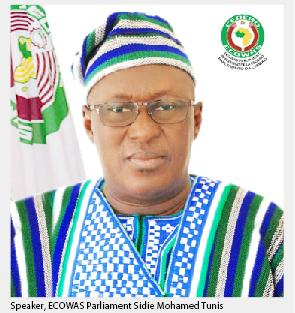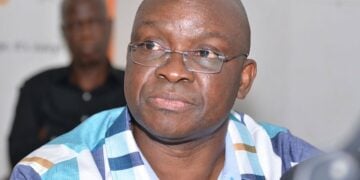Parliamentarians of the Economic Community of West African States (ECOWAS Parliament) have called for caution over the proposed use of military intervention in Niger Republic as an option if diplomatic measures fail to restore deposed president Mohamed Bazoum to power.
This followed the decision of the Authority of Heads of State and Government of ECOWAS which reiterated the option of force in their August 10 meeting in Abuja if the coup plotters led by General Abdourahmane Tchiani who toppled President Mohamed Bazoum on July 26 refuse to reinstate him.
In yesterday’s extraordinary session of the parliament on the situation in Niger which was held virtually, the speaker of the parliament, Sidie Mohamed Tunis, revealed the intentions of the ECOWAS to address the coup in Niger.
17 of the regional legislators out of about 21 that participated in the session opted for dialogue and mediation option. Others were however of the view that ECOWAS needs to be firm in its decision to stop the spate of coups otherwise it could encourage more.
Leading those opposed military intervention was the first deputy speaker of the parliament, Idris Ahmed Wase from Nigeria. Wase in his submission, said; “We do not want military intervention in Niger or any part of West Africa. We do not want war, we must go through a diplomatic process. There are consequences of going to war. Right now, Nigeria is suffering from the devastation of Boko Haram violence; military action will lead to more destruction.
“Our region is very fragile therefore diplomacy is the most important route. War with Niger will affect 60% of Nigerians and we are not going to fight only Niger but the countries that are in solidarity with them such as Mali, Guinea and Burkina Faso.”
Dr Mohammed Kabeer Garba in his submission said; “We do not want military intervention because war has never solved any problem. Diplomacy is the right option. The people of Nigeria are also opposed to this proposed military intervention.”
He also advised the Nigerian government to restore Niger’s electricity supply and lift sanctions on food to ease the suffering of people, adding that the sanctions are biting harder.
Fatimatou Ngai from The Gambia in her submission noted that while it was understandable that the Authority of Heads of State desired to take firm action against the spate of coups in the region; “The threat of the use of force should not have been issued to the junta leaders. She advised the leaders to take a look at the root causes of coups and try to address them.
She said; “The threats have not worked in the case of Mali, Guinea and Burkina Faso” adding that it may not work in the case of Niger. She noted that it was better to have started with diplomacy even as she advised that any delegation sent to Niger must include women because according to her they bear the brunt of the war.
Emmanuel Kwasi Bedzrah from Ghana said giving the plotters an ultimatum was not the best thing to do even if the regional bloc has zero tolerance for power obtained through the use of force. He warned of the consequences of war because of the involvement of super powers in the Nigerien impasse. He also advised the regional leaders to reach out to the super powers that might be behind the unconstitutional takeover of power.
Hon. Ali Djibo from Niger noted that his country had already been ravaged by jihadists, stressing that even the ECOWAS charter was drafted by some former coup leaders in the region and questioned who will attack Nigeria if a coup happens in the country and how the region is going to close the borders against Nigeria.
“We are members of the G5 Sahel and the budget is just $1 billion while in the case of the crisis in Ukraine one Western power has already given Ukraine $300 billion . So, who wants military action in Niger, do they want Bazoum killed? I am surprised at what is driving ECOWAS to attack Niger, so the best option is dialogue.
“There are institutional coups where leaders rig elections in West Africa and ECOWAS did not condemn such acts of manipulations and some also change their constitution to elongate their tenure, so why are they planning to attack Niger?”
Senator Ali Ndume from Nigeria in his reaction was vehement in opposing war. He quoted parts of the Nigerian constitution which said the Nigerian president cannot declare war without the approval of the National Assembly, adding that the Nigerian senate had not approved the war option.
“Therefore any declaration of war will be illegal and unconstitutional,” he said. He also frowned at the economic sanctions slammed on Niger without the approval of the representatives of the people, describing it as unconstitutional; adding that going to war would be a costly mistake and an exercise in illegality.
Hon. Awaji Inombek Abiante from Nigeria wondered why ECOWAS did not go to war in Mali, Guinea and Burkina Faso but decided to start issuing threats of war in Niger. He noted that dialogue and diplomacy remained the best options. He pointed out that the regional bloc must address the crisis in the sub region and avoid taking actions that may force member states to contemplate leaving the bloc.
Abdullahi Balarebe Salame, in his reaction said ECOWAS should not have threatened the coup plotters with war.
“We have cut their electricity and closed borders with Niger and other sanctions. We must send a mediation team immediately,” he said.
However, Hon. Linda Ikpeazu from Nigeria warned that if drastic action is not taken against the spate of coups it could spread.
“There is a dangerous trend in our sub region with coups spreading. We used diplomacy in Mali, Burkina Faso and Guinea, what is the result? This attitude will encourage people to plot more coups. I am not encouraging war but how effective was the use of diplomacy in these countries? So, we must do something to avert military coups in West Africa,” she said.
Hon. Vilane Abdoulaye in his submission expressed approval of the ECOWAS Heads of States and government and pleaded with the parliament to go with the decisions of the Heads of State and give them the legal and financial backing in terms of deploying resources to reinstate the ousted President Bazoum .
“We must adopt the decisions of the Heads of states otherwise we will not have democracy again in the region,” he submitted.
Hon. Billay Tunkara(Gambia) was of the view that West Africa must sustain democracy and should also consider military intervention as the last option if the regional bloc must abide by its protocol to restore democratic order in Niger otherwise the spate of coups will increase.
Orlando Parreira Dias (Capo Verde) also supported military intervention, stressing that ECOWAS must be more firm in taking decisions against coup plotters.
Meanwhile, as the parliament did not adopt any resolution on the matter, Speaker Tunis set up a committee to mediate in the situation. The committee would be led by the first deputy speaker Idris Wase and their term of reference is to meet with the junta in Niger Republic and find diplomatic ways to resolve the matter.
Others members of the committee include Edwin Snowe, Fatimatou Ngai, Ali Ndume, Orlando Parreira Dias among others.





